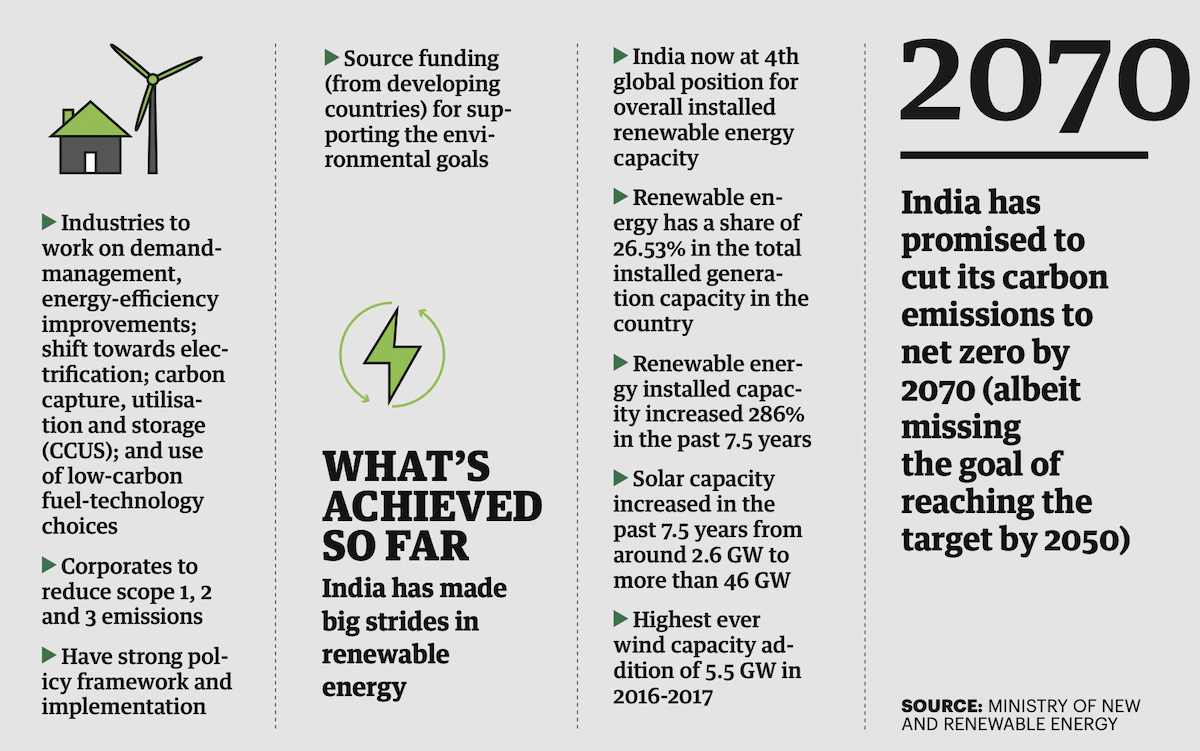Ahmedabad
(Head Office)Address : 506, 3rd EYE THREE (III), Opp. Induben Khakhrawala, Girish Cold Drink Cross Road, CG Road, Navrangpura, Ahmedabad, 380009.
Mobile : 8469231587 / 9586028957
Telephone : 079-40098991
E-mail: dics.upsc@gmail.com

The Net Zero Challenge
News: Recently, RBI report “Towards a greener Cleaner India” provides a framework to discuss trade-offs between Growth, Inflation and efforts to transition to a Net Zero economy.
What it Net Zero?
According to United Nations, Net zero means cutting greenhouse gas emissions to as close to zero as possible, with any remaining emissions re-absorbed from the atmosphere, by oceans and forests for instance.
The science shows clearly that in order to avert the worst impacts of climate change and preserve a livable planet, global temperature increase needs to be limited to 1.5°C above pre-industrial levels.
Currently, the Earth is already about 1.1°C warmer than it was in the late 1800s, and emissions continue to rise. To keep global warming to no more than 1.5°C – as called for in the Paris Agreement – emissions need to be reduced by 45% by 2030 and reach net zero by 2050.
What challenges India is likely to face?
India’s ambition is to achieve an advanced economy status by 2047 and it seeks to lower its emissions to achieve net zero status by 2070.
An annual GDP growth rate of 9.6% would raise net GHG emissions by 10.5 times of level in 2021-22. According to the report, Nationally Determined Contributions (NDC’s) will set back economic output by as much as 9% by 2049.
Transitioning to Net Zero will ensure that productive life of existing fossil-based assets will be shortened, thus exposing the banking sector (through loans) to these assets.
The report also weighs on inflationary impact of the status quo against the alternative of achieving net zero. As per the report, the latter will raise prices over the next 3 years but will subdue persistent inflationary effects over the long term.
Due to extreme weather events there are risks to assets (loans by banks) and therefore to banking sector.
What solutions does the report provide?
The report emphasizes on Fiscal intervention through Carbon Tax or Emission Trading system.
The report suggests increasing the share of green energy in primary energy consumption and reduce emission intensity.
Shift in production to less energy intensive sectors – Fisheries, textiles etc.
Conclusion
RBI is taking the lead in India’s transition towards achieving Net Zero status but it is evident that Fiscal policy and regulatory measures are equally important.
Source – RBI

Address : 506, 3rd EYE THREE (III), Opp. Induben Khakhrawala, Girish Cold Drink Cross Road, CG Road, Navrangpura, Ahmedabad, 380009.
Mobile : 8469231587 / 9586028957
Telephone : 079-40098991
E-mail: dics.upsc@gmail.com
Address: A-306, The Landmark, Urjanagar-1, Opp. Spicy Street, Kudasan – Por Road, Kudasan, Gandhinagar – 382421
Mobile : 9723832444 / 9723932444
E-mail: dics.gnagar@gmail.com
Address: 2nd Floor, 9 Shivali Society, L&T Circle, opp. Ratri Bazar, Karelibaugh, Vadodara, 390018
Mobile : 9725692037 / 9725692054
E-mail: dics.vadodara@gmail.com
Address: 403, Raj Victoria, Opp. Pal Walkway, Near Galaxy Circle, Pal, Surat-394510
Mobile : 8401031583 / 8401031587
E-mail: dics.surat@gmail.com
Address: 303,305 K 158 Complex Above Magson, Sindhubhavan Road Ahmedabad-380059
Mobile : 9974751177 / 8469231587
E-mail: dicssbr@gmail.com
Address: 57/17, 2nd Floor, Old Rajinder Nagar Market, Bada Bazaar Marg, Delhi-60
Mobile : 9104830862 / 9104830865
E-mail: dics.newdelhi@gmail.com